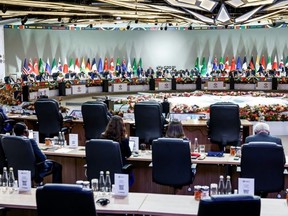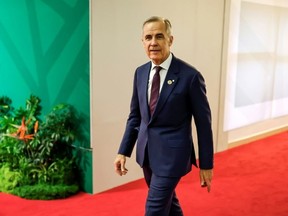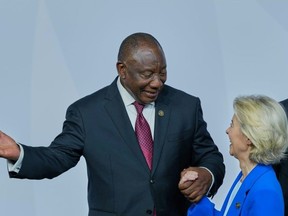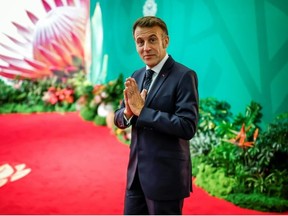“We are experiencing not a transition, but a rupture”

Contents of the article
Johannesburg (AFP) – G20 leaders meeting in South Africa on Sunday welcomed multilateralism – even as they struggled to adapt to a changing world order plagued by a lonely US policy, wars and deepening geopolitical rivalries.
Advertisement 2
Contents of the article
The final day of the weekend summit, boycotted by the United States, began with a wide-ranging debate on how the G20 can survive in a fractured world.
Contents of the article
Contents of the article
“We are not experiencing a period of transition, but a rupture,” Canadian Prime Minister Mark Carney admitted to reporters on the eve of the summit.
“Too many countries are retreating into geopolitical blocs or the battlefields of protectionism,” he said, but added: “In every rupture lies a responsibility to create: nostalgia is not a strategy.”

Dozens of leaders from the world's key economies, including Europe, China, India, Japan, Turkey, Brazil and Australia, attended the summit, the first in Africa.
US President Donald Trump's government ignored the event, saying South Africa's priorities, including cooperation on trade and climate, were at odds with its policies.
Contents of the article
Advertisement 3
Contents of the article
The United States is withdrawing from multilateral forums as they increase trade volatility with steep tariffs and abandon commitments to combat global warming.
Trump officials have also made unsubstantiated accusations of “white genocide” in South Africa.
– “Fragmentation” –

In a joint G20 statement released on Saturday, the leaders in attendance said they were meeting “against a backdrop of growing geopolitical and geo-economic competition and instability, worsening conflicts and wars, deepening inequality, increasing global economic uncertainty and fragmentation.”
South African President Cyril Ramaphosa acknowledged the “challenges” but said: “The G20 underscores the value of keeping multilateralism relevant.”
Advertisement 4
Contents of the article
The leaders' statement came despite Washington's opposition to any statements at the summit on behalf of the G20.
British charity Oxfam said that “South Africa has set an example for the world in ensuring that the G20 stands firm and collectively agrees on a leadership declaration – championing multilateralism – despite strong opposition.”
However, French President Emmanuel Macron said on Saturday that “the G20 may be coming to the end of a cycle.”
The country needs to refocus its priorities on strategic economic issues in the future, he said, noting “difficulties” in the G20 finding common approaches to armed conflicts around the world.
This to some extent reflects the US intention to limit G20 discussions to only macroeconomic topics as it takes over next year – when Trump plans to host the summit at his golf club in Florida.
Advertisement 5
Contents of the article
– “lifeline” to multilateralism –

The G20, which includes 19 countries plus the European Union and the African Union, was founded after the 1997–1998 Asian financial crisis as a forum to strengthen global economic and financial stability.
Over time, his discussions have expanded to also include climate change, sustainable development, global health and conflict.
While these areas have economic implications, they are also political, which often leads to dead ends or omissions in the development of summit declarations.
Disagreements have only intensified due to Russia's war in Ukraine and the conflict between Israel and Hamas in the Gaza Strip.
Carney, whose country holds the G7 presidency this year followed by France next year, also said the “center of gravity in the global economy is shifting,” implying the G20 needs to pay more attention to emerging economies and the global South.
William Gumede, a management professor at the University of the Witwatersrand in South Africa who advises governments including Turkey, noted that several non-G20 countries, including African ones, were invited to the summit.
“Bringing emerging powers and developing countries in was like creating a whole new world in the G20, and it actually helped offset Trump's absence,” he told AFP.
“This summit has effectively become a lifeline for multilateralism, breathing new life into it,” he said.
Contents of the article






